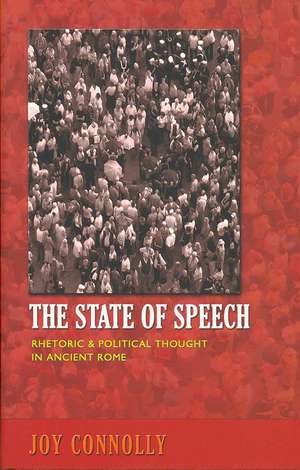The State of Speech – Rhetoric and Political Thought in Ancient Rome
Autor Joy Connollyen Limba Engleză Hardback – 23 aug 2007
Transcending traditional lines between rhetorical and political theory, The State of Speech is a major contribution to the current debate over the role of public speech in Roman politics. Instead of a conventional, top-down model of power, it sketches a dynamic model of authority and consent enacted through oratorical performance and examines how oratory modeled an ethics of citizenship for the masses as well as the elite. It explains how imperial Roman rhetoricians reshaped Cicero's ideal republican citizen to meet the new political conditions of autocracy, and defends Ciceronian thought as a resource for contemporary democracy.
| Toate formatele și edițiile | Preț | Express |
|---|---|---|
| Paperback (1) | 199.43 lei 6-8 săpt. | |
| Princeton University Press – 16 ian 2014 | 199.43 lei 6-8 săpt. | |
| Hardback (1) | 498.46 lei 6-8 săpt. | |
| Princeton University Press – 23 aug 2007 | 498.46 lei 6-8 săpt. |
Preț: 498.46 lei
Preț vechi: 615.38 lei
-19% Nou
Puncte Express: 748
Preț estimativ în valută:
95.44€ • 99.38$ • 79.19£
95.44€ • 99.38$ • 79.19£
Carte tipărită la comandă
Livrare economică 14-28 februarie
Preluare comenzi: 021 569.72.76
Specificații
ISBN-13: 9780691123646
ISBN-10: 0691123640
Pagini: 328
Dimensiuni: 165 x 241 x 29 mm
Greutate: 0.59 kg
Editura: Princeton University Press
Locul publicării:Princeton, United States
ISBN-10: 0691123640
Pagini: 328
Dimensiuni: 165 x 241 x 29 mm
Greutate: 0.59 kg
Editura: Princeton University Press
Locul publicării:Princeton, United States
Notă biografică
Joy Connolly is assistant professor of classics at New York University. She is the author of Talk about Virtue (forthcoming, Duckworth), a book about Roman political theory.
Descriere
Focuses on Rome's practitioner and theorist of public speech, Cicero. This book shows how Cicero's treatment of the Greek rhetorical tradition's central questions is shaped by his ideal of the republic and the citizen. It is a contribution to the debate over the role of public speech in Roman politics.
